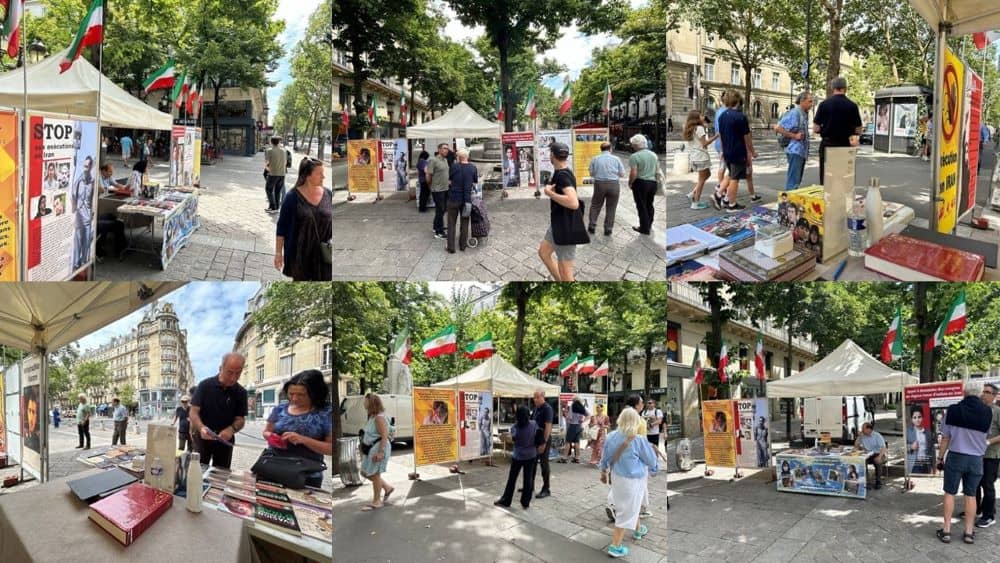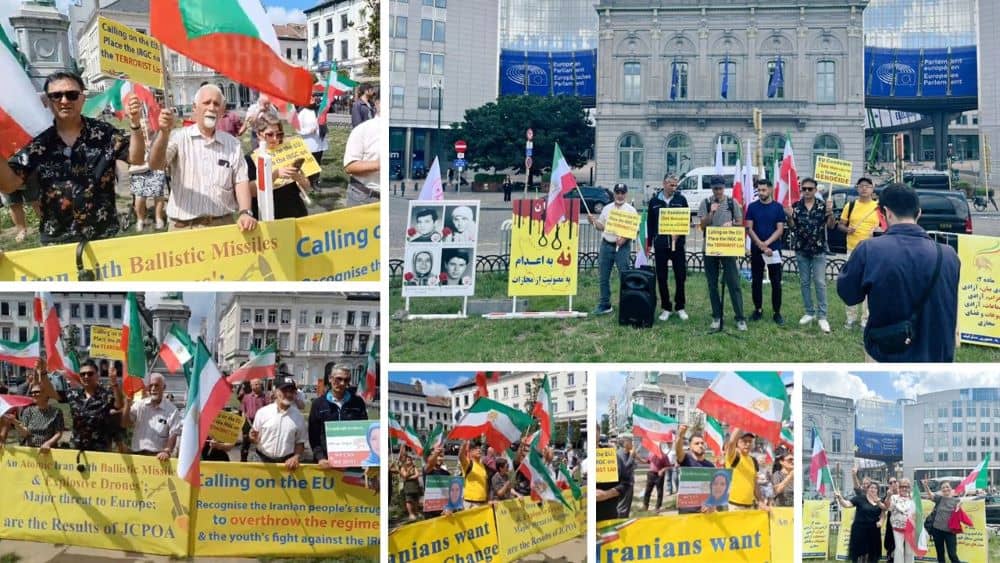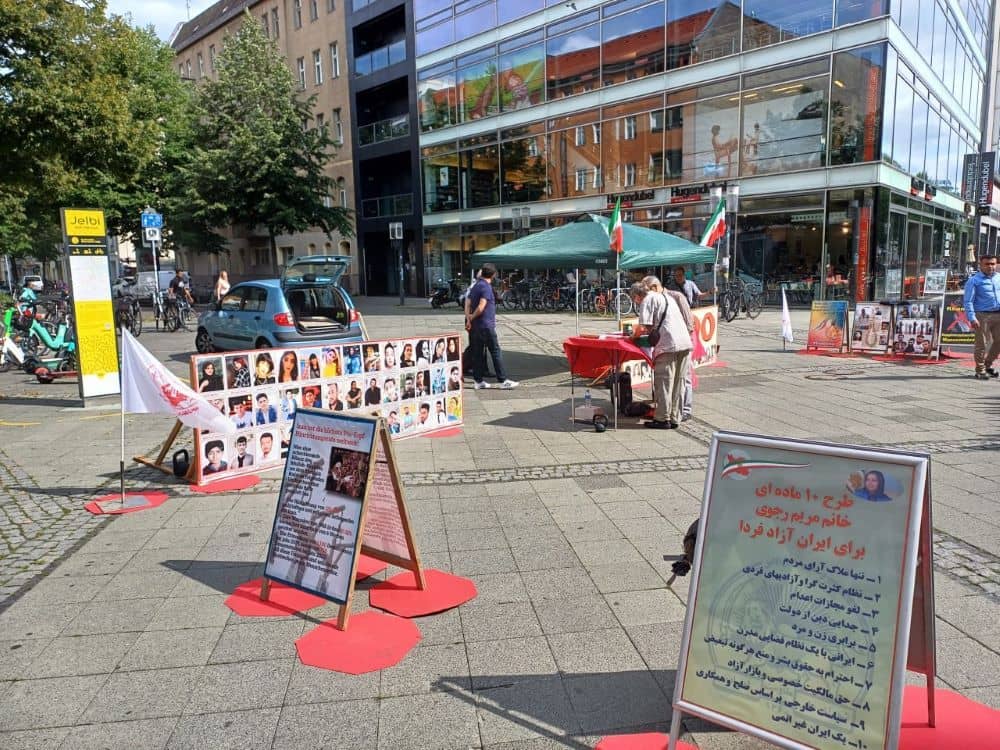“Call for Justice on 1988 Massacre” conference in Ashraf 3, home to PMOI/MEK members – Tirana, Albania – July 15,2019
Iranian opposition calls for accountability of regime officials involved in 1988 massacre
In the fifth consecutive day in the rallies held at Ashraf3, residence of the MEK members in Albania, international dignitaries joined National Council of Resistance of Iran’s (NCRI) President-elect Maryam Rajavi, at a conference titled “Call for Justice on 1988 Massacre” which calling for the accountability of Iranian regime officials involved in the summer 1988 massacre of over 30,000 political prisoners across Iran. Most of these victims were members or supporters of the Iranian opposition group People’s Mojahedin Organization of Iran (PMOI/MEK).
This conference “Call for Justice on 1988 Massacre” was held in Ashraf 3, home to PMOI/MEK members in Tirana, Albania, following a series of other events and panels on the sidelines of the MFK’s annual conference.
The conference was narrated by Behzad Naziri, a PMOI/MEK member who witnessed first hand glimpse of the mullahs’ human rights violations and survived the Iranian regime’s dungeons after enduring several years of unspeakable tortures.
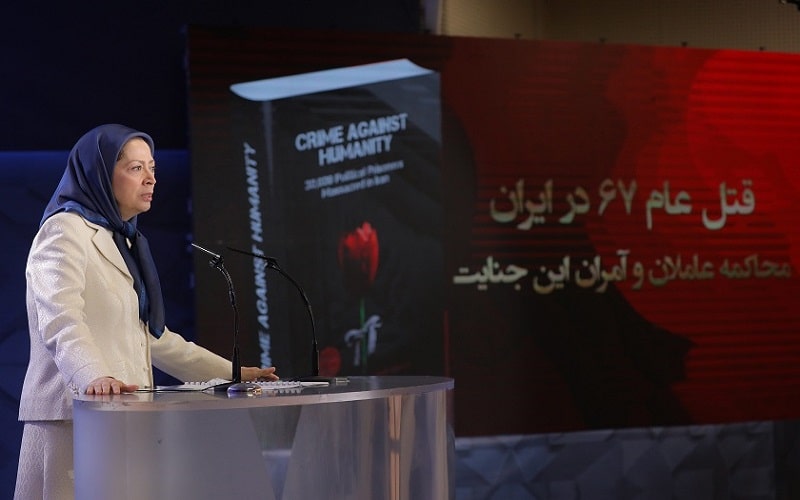
NCRI President Maryam Rajavi was the keynote speaker at the event “Call for Justice on 1988 Massacre”.
“As we are approaching the 31st anniversary of the martyrdom of 30,000 political prisoners massacred on Khomeini’s fatwa for the crime of remaining loyal to their pledges over the name of Mojahedin and their ideal, i.e. freedom of the people of Iran,” said NCRI president-elect Maryam Rajavi.
“The massacre of political prisoners was a blood-drenched encounter between the Middle Ages and a generation which created the 1979 revolution, a generation resolved to achieve a society based on freedom & equality, but encountered the monster of religious fascism,” she added.
“The 1988 massacre was the horrifying scene of such historic confrontation, but it was not the end. It was the beginning of a new confrontation, continuing to this day, and will write the fate of the Iranian nation in freedom,” NCRI President Maryam Rajavi continued.
“Khomeini’s intention in ordering the 1988 massacre was to totally uproot and obliterate the Mojahedin. To this end, he deployed his killing machine in several areas. The most intense killings began in Evin and Gohardasht prisons, aimed specifically at members of the PMOI/MEK,” Mrs. Rajavi emphasized.
“In the latest list of victims compiled by the PMOI/MEK indicates that the 1988 massacre took place in at least 110 cities,” the Iranian opposition President added.
“The consequences of giving impunity to the masterminds and perpetrators of the 1988 massacre have not been limited to human rights, and the perpetuation of torture and executions, but have emboldened the Iranian regime in exporting terrorism and warmongering,” Mrs. Rajavi highlighted.
As we are approaching the 31st anniversary of the martyrdom of 30,000 political prisoners massacred on Khomeini’s fatwa for the crime of remaining loyal to their pledges over the name of Mojahedin and their ideal, i.e. freedom of the people of Iran. #1988Massacre #Iran pic.twitter.com/cCUp4JnO4D
— Maryam Rajavi (@Maryam_Rajavi) July 15, 2019
The massacre of political prisoners was a blood-drenched encounter between the Middle Ages and a generation which created the 1979 revolution, a generation resolved to achieve a society based on freedom & equality, but encountered the monster of religious fascism. #Iran pic.twitter.com/z5PNzne3UF
— Maryam Rajavi (@Maryam_Rajavi) July 15, 2019
Next speaker was Juan Garce, eminent Spanish lawyer who hold accountable former Chilean dictator Augusto Pinochet for atrocities committed by the latter in Chile.
“In the case of Ashraf, we found that the rights of Ashraf could be reviewed by a judge and they could be protected by law, and the people who were responsible for your suffering could be held responsible by a criminal court,” said the renowned Spanish jurist.
“In the case of the 1988 massacre, this is a crime against humanity. Not only the criminal code of Iran had been violated, but also the known international norms were trampled during and before this crime,” he added.
“We need to know the facts, those responsible, the rights trampled, and which court is qualified to tend to this case. You have the right to the truth. You have the right to reparations and the right to justice,” Mr. Juan Garcés continued.
“The court of justice and the investigation cannot be allocated to Iran. While it is not possible to carry out this investigation in Iran, there are other instruments, such as the International Criminal Court, and courts of justice in other countries. The UN Security Council is qualified to set up a tribunal,” he stressed.
“Many facts show that the 1988 massacre is a crime that has continued to this day, meaning the ICC, founded after this crime was committed, is qualified to tend to this case,” Mr. Garcés further implied.
“Judiciary work is difficult, political conditions are changing and may become favorable for this crime. However, international law does not recognize the amnesty that these regimes bestow upon themselves after committing these crimes. We must seek a court of justice that will investigate this case and bring the perpetrators to justice. I’m sure you will be victorious,” he concluded.
Tahar Boumedra, former UN special representative for human rights in Iraq was the next speaker.
“Within the framework of an association of international lawyers founded in London, Justice for the Victims of the 1988 Massacre in Iran (JVMI), we’re gathering evidence of the possible prosecutors of the political prisoners and the perpetrators,” said Mr. Boumedra.
“We have applied the criteria of fact-finding criteria of UN missions. We have only put down evidence that is beyond doubt evident. We ended up by identifying 70 suspect perpetrators who are beyond any doubt involved in this massacre. The documents are available. We made it available to the UN and the High Commissioner of Human Rights and the diplomatic community,” he added.
“We have identified these perpetrators. Mrs. Rajavi put her hand on the type of crime committed. International lawyers, such as Jeffrey Robertson, have qualified the 1988 massacre not only as a crime against humanity but also possibly a genocide,” Mr. Tahar Boumedra continued.
“Among other evidence we gathered, published in a separate document by the JVMI, is the location of the mass graves. These locations are very well identified. Anyone who challenges these documents, we invite them to go to the locations and verify for themselves,” the former UN special representative for human rights in Iraq added.
“We have identified the facts, the crimes, the perpetrators and the victims. How are we going to proceed?” he asked.
Mr. Boumedra recounted his experience in being in a group of jurists who referred the case of Hassan Al-bashir to the UNSC in 2010. “He is a fugitive now. He’s on the run,” Mr. Boumedra explained.
“We have identified 120 countries which could entertain the judicial process of crimes against humanity, the crimes of war and genocide. We’re not dreaming. The situation changes,” he stressed.
Groups of witnesses spoke of their experience in the mullahs’ prisons. “Call for Justice on 1988 Massacre”
“I was in the regime’s prisons for six years. The Revolutionary Guards (IRGC) arrested me while I was pregnant. I was taken to Evin prison and the torture chambers. I was transferred to Ward 209. In the cell, I saw four torturers torture my husband in front of me. They also tortured me in front of him,” said Ms. Kobra Jokar.
“A few days later, they executed him with 75 others. The torturer said, ‘I wanted him to never see his son.’ “The regime had executed 50 pregnant women, including Masumeh, the sister of Mrs. Rajavi. They took me to a hospital and quickly brought me back to prison even though. I was feeling very bad,” she added.
Hengameh Haj Hassan
“I was a nurse in Tehran. In 1981, I was arrested because I was an MEK supporter. We were charged with helping the people who were injured by the IRGC,” said Ms. Hengameh Haj Hassan.
“In prison, we were subjected to severe tortures. Insomnia, packed cells, sleeping in coffins were what we had to endure,” she added.
“We were taken to the cages. These were small partitions where you could only squat. You couldn’t move, you couldn’t even cough or sneeze. If we moved, we were tortured. Our eyes were blindfolded. My eyesight has been degraded and my back was injured. I was operated five times and yet I still have not recovered,” Ms. Haj Hassan continued.
“When we came out of the ‘cages’ our friends didn’t recognize us. When we were in the cages, the torturers used any excuse to torture us,” she emphasized.
“The torturer told us that we would die here. We were only given three minutes per day to go to the bathroom. We couldn’t even brush our teeth. The food they gave us was scarce and very dirty. At night, when we were allowed to sleep, they would turn on loudspeakers and play the regime’s mourning songs,” Ms. Haj Hassan added.
“The torturers sought to break our will and force us to turn our back to our struggle. I decided that I would teach them a lesson and show them who we were. My friend, Shekar, was arrested with me, and she was executed in 1988 after suffering torture and the cage,” she continued.
“I decided to prepare myself for very hard days. I meticulously organized my daily schedule. I rehearsed all my school courses, all the poems I knew, all the songs. I had a physical exercise program. We weren’t allowed to move, but I exercised in my mind,” Ms. Haj Hassan said.
“At nights, when we couldn’t sleep due to the loudspeakers, I trained myself to shut down those noises and take myself to pleasant places in my memories,” she added.
“The hardest times were the feeling of loneliness. I thought of God, and I thought of my leader, Massoud Rajavi. I spoke to him, and this way, I didn’t feel alone anymore,” Ms. Haj Hassan continued.
“The torturers thought they would break our will through torture. However, they only made us stronger, as we understood that this proved what we were doing was right,” she added.
“In prison, we considered ourselves PMOI representative and we deemed it our responsibility to defend their values. When I came out of prison, the first thing I did was rejoin my organization. This is a path that will continue till the end,” Ms. Haj Hassan concluded.
Homa Jaberi
“I was in the regime’s prisons for five years and I witnessed many tortures. I was arrested in 1981 and spent many years in Gohardasht and Evin prisons. When the regime wasn’t able to break the will of MEK prisoners through torture, they created a compound called the ‘residential units,’” said Ms. Homa Jaberi.
“This was a secret compound. I was there for 40 days. In the first day, I was tortured brutally with whips and physical beaten. They took all of us to a room, blindfolded us, and told us that they would kill us until that night. They tortured us for hours until midnight,” she added.
“My hands were swollen from the whip lashes. My face and body was bruised. The regime’s torturer said, ‘No one will hear you here. You will all die here.’ They kept us awake for many days and didn’t let us sleep,” Ms. Jaberi continued.
“Some of my friends were kept in this place for six months. We weren’t even aloud to scream under torture. Every command was given with whip lashes. For instance, if they wanted to tell us that we could sleep, they would do so by whipping us,” she added.
“After 40 days, I was taken to Evin Prison. Some of my friends had lost their mental balance. Some of the prisoners would not even speak of the tortures they had suffered. They said that the torturers made them make animal noises and insult themselves. Some had been raped,” Ms. Jaberi explained.
“I have faith that with the leadership of Massoud and Maryam Rajavi, we will free Iran. It was this faith that helped me overcome the tough conditions of prison,” she concluded.
“I spent 17 years in prison. My crime was supporting the MEK. I witnessed many human rights violations. The 1988 massacre was a premeditated and well-planned crime. Some of the people who were directly involved in this crime still hold high positions of power. The regime has done everything in its power to hide its crime. It didn’t even tell the burial places to the families of the victims,” said Mr. Majid Sahebjam
“During the massacre, the judges only asked one question, in a short trial, a few minutes. They asked about the crime of the defendant. Uttering the word ‘Mojahed’ was enough to seal the fate of the prisoner and send him to the gallows,” he added.
“Many of the prisoners were aged 14,15 and 16 when they were arrested. These people were later executed by the regime,” he explained.
“During the 1988 massacre, dozens of MEK supporters had served their sentence. However, they were kept in prison because they would not repent their support for the MEK. They were executed in 1988 because of their dedication to freedom and human values,” Mr. Sahebjam concluded.
Mostafa Naderi
“I spent 11 years in prison, five of those years in solitary confinement. During the 1988 massacre, I was hospitalized because of torture. I was unconscious when they called my name for execution, and this is how I survived,” said Mr. Mojstafa Naderi.
“After the executions, when you were taken to the cells, they asked your name and checked in a notebook. In the notebook, all the names were crossed, which meant they were executed,” he added.
“In the beginning, they said nothing of the executions, claiming the prisoners were going for family visits. In many smaller cities, not even a single person survived to tell the story of the massacre,” Mr. Naderi continued.
“In prison, I was severely tortured. After eight months of torture, I and five other prisoners were taken to a mullah who said we would be executed that night. They took us to the place for execution. They tied our hands and we heard the guns being loaded. They fired, but they aimed a bit higher than our heads. We suffered a traumatic experience. One of the prisoners fainted and another lost his eyesight,” he recalled.
“The 1988 massacre was planned from two years before. However, the massacre continues to this day. We must stop this,” Mr. Naderi concluded.
“I spent 10 years in the regime’s prisons. Many of my friends were teenagers when they were arrested. They spent many years in prison and were finally executed. People who had served their sentences and their families were waiting for them. However, they never got to see them,” Mr. Mahmoud Royaie.
“One of my friends was executed five years after his sentence was finished. He was taken to the gallows just as he defended the name of Mojahed. Many of the prisoners’ families died after their loved ones were executed. The father of one of my friends had a cardiac arrest when he heard about his son’s execution. The regime even executed our families,” he continued.
“Some of these families are still staring at the pictures of their loved ones and crying after 30 years. Some of the parents lost their sanity when their children were executed,” Mr. Royaie added.
“The regime even executed the disabled and handicaps. Yet they stood tall when they went to the gallows. One of my friends had lost his mentality due to the tortures. However, when they took him to the judge, he stood tall and said, ‘I’m a Mojahed.’ He was executed,” he explained.
“The 1988 massacre was a national disaster, but it is also the pride of our nation. Today, people who weren’t even born then are calling for justice. The members of the 1988 ‘Death Commission’ are members of the government today,” Mr. Royaie recalled.
“When I think about those people, I am humbled. With the justice movement, I feel that they’re here with us, in Ashraf 3,” he concluded.
Sid Ahmed Ghozali, former Algerian Prime Minister and Chair of the Arab-Islamic Committee for Solidarity with the People of Iran was the next speaker.
“We’ve all heard about these massacres. Today, the victims themselves speak to us. We can no longer be observers, albeit sympathetic. We must be responsible. When we become witnesses, the law of men forbid us to remain silent and do nothing,” he said.
“The question we must ask ourselves, we must reflect, especially we the folks of Arab countries. We can’t forgive ourselves if we continue to ignore this and tell ourselves that Iran is far and doesn’t concern us. Crimes against humanity are well defined in the books, and even the Quran says that anyone who kills a single innocent person has killed the entire humanity,” he added.
“The laws of men and God forbid us to remain silent when we become witnesses. As the President of the Committee for Solidarity with the People of Iran, I invite my friends in Arab countries to learn about what happens in Iran and seek justice. We don’t seek revenge, but we seek justice,” Mr. Ghozali continued.
“This is our collective responsibility. There are thousands of films about the massacre of the Jews. We must have an equal number of documents on what we just heard. I have never been tortured, but I feel immense pain when I hear these testimonies. Pregnant women killed. Babies killed inside the womb of their mothers,” he concluded. “This has been a hard silence. It’s not enough to shed tears. We must act.”
Former US senator Robert Torricelli was the next speaker.
“I have never witnessed anything like what I’ve heard today. I’m from a different faith and nationality, but I’ve committed myself to your struggle. It is difficult to find any reason in anything we have heard. It would be easy to leave this room with nothing in your hearts but despair.”
“There was a time in human history where the human conscience was protected by these artificial lines we draw on these maps,” he added.
Sen. Torricelli explained how those involved in different genocides and crimes against humanity, including the Holocaust and Cambodia, were brought to justice.
“This exhibition is only a tip of the iceberg. In just two years, the regime executed 477 adolescents and youth, including three 12-year-olds. Eight people were 13 years old. 19 individuals were 14 years old. 32 individuals were 15 years old. Others were 16 and 17 years old,” said. Ms. Fereshteh Akhlaghi who has researched about the 1988 massacre for decades.
“55 pregnant women were executed. One of the pregnant women was summoned by the executioner, who told her he had executed her husband, and then offered to release her if she interviewed with state TV. She spat in the judge’s face,” she added.
“A husband and wife were arrested and tortured to such an extent that they could not recognize each other when they met after two weeks,” Ms. Akhlaghi continued. “The sister or Mrs. Rajavi was executed while six-month pregnant…”
“The regime also executed and tortured the elderly. The mother of the Shafaie family, all of whom were executed, was also executed by the regime. Before her execution, she said, ‘I’m proud that I’ve given my all for freedom,’” she recalled.
“I’m sure that with the leadership of Mrs. Rajavi, there will be no more torture and execution in our dear Iran,” Ms. Akhlaghi concluded.
Peter Murphy, Co-Secretary of Australian Supporters of Democracy in Iran
“We see three fundamental changes. The first is the continuation of uprisings in Iran. The second is the establishment of Ashraf 3. The third is the Trump administration’s break with the appeasement policy. This is the result of the continuous work of the MEK and NCRI coming here year after year to convey this message,” he said.
“We are calling for our States to speak out for justice. We are calling on the Australian government to condemn this crime against humanity and pursue justice for this crime,” he concluded.

